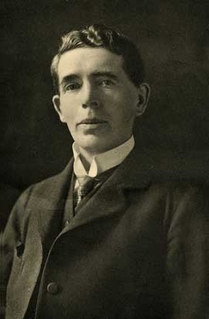A Quote by Hilary Mantel
Like a historian, I interpret, select, discard, shape, simplify. Unlike a historian, I make up people's thoughts.
Related Quotes
If you have things or are involved with things that turn on, it's going to have code. And there are so many people - let's pick on the historians - even as a historian, let's say I ended up going the road of being a historian, just knowing some basic scripts, any kind of automation would have made me a 10 times better historian because I wouldn't have to sit there changing every file name to "1234" and then "12345." It can have a transformative value.
I may remind you that history is not a branch of literature. The facts of history, like the facts of geology or astronomy, can supply material for literary art; for manifest reasons they lend themselves to artistic representation far more readily than those of the natural sciences; but to clothe the story of human society in a literary dress is no more the part of a historian as a historian, than it is the part of an astronomer as an astronomer to present in an artistic shape the story of the stars.





































